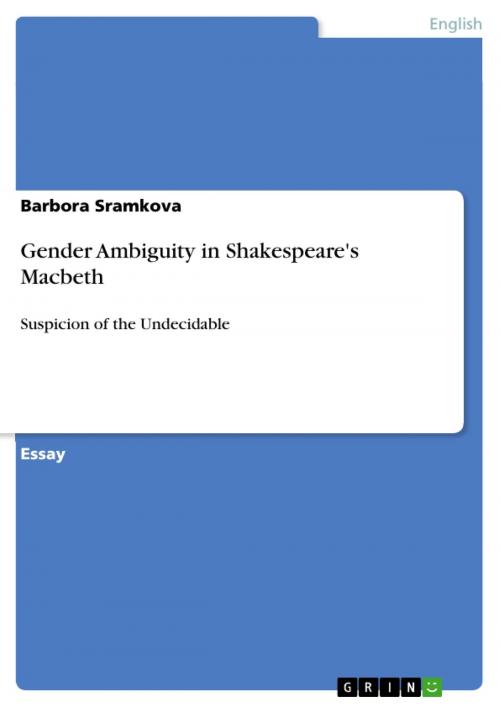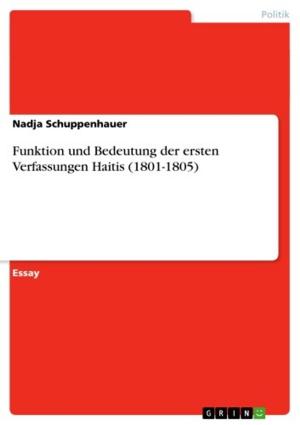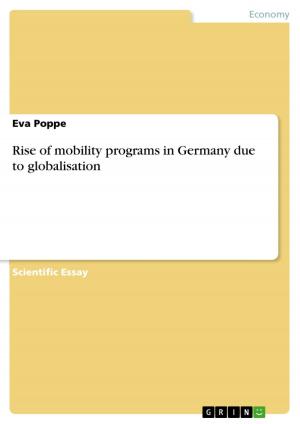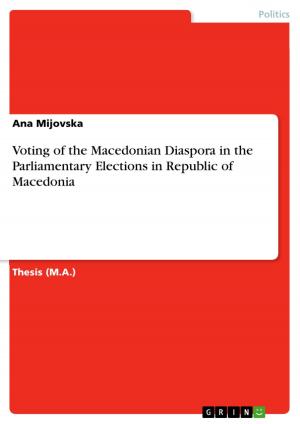Gender Ambiguity in Shakespeare's Macbeth
Suspicion of the Undecidable
Fiction & Literature, Literary Theory & Criticism, British| Author: | Barbora Sramkova | ISBN: | 9783640427000 |
| Publisher: | GRIN Publishing | Publication: | September 16, 2009 |
| Imprint: | GRIN Publishing | Language: | English |
| Author: | Barbora Sramkova |
| ISBN: | 9783640427000 |
| Publisher: | GRIN Publishing |
| Publication: | September 16, 2009 |
| Imprint: | GRIN Publishing |
| Language: | English |
Essay from the year 1996 in the subject English Language and Literature Studies - Literature, grade: 1, University Of Wales Institute, Cardiff (Cardiff School of English, Communication and Philosophy), course: Shakespeare's Tragedies, language: English, abstract: Probably the most powerful lines lingering in the reader's or audience's memory after experiencing Macbeth are the hero's words in reaction to the news of the death of his spouse: 'Out, out, brief candle! Life's but a walking shadow, a poor player That struts and frets his hour upon the stage And then is heard no more. It is a tale Told by an idiot, full of sound and fury, Signifying nothing.' (V, 5, 23-28) When life signifies nothing, does this play signify anything? However simple the question may seem, the answer is hardly straightforward. Trying to stay away from moralising about vaulting ambition that doesn't pay in the end I would like to speculate about possible significations of the play, not necessarily connected to the plot, or to put it in another way, examine the possibly significant themes and motives recurrent in the play: ambiguity, uncertainty or indeterminacy of meaning. Equivocation is the term used in the play itself (e.g. the porter scene in III, i) and it well captures the theme of walking the tightrope above the abyss of single, definite meaning on one hand, and the endless proliferation of meaning on the other. One cannot escape the impression that the thematically prominent characters of the play (Macbeth, Lady Macbeth, the witches, the Porter) virtually evade committing themselves to definite meanings.
Essay from the year 1996 in the subject English Language and Literature Studies - Literature, grade: 1, University Of Wales Institute, Cardiff (Cardiff School of English, Communication and Philosophy), course: Shakespeare's Tragedies, language: English, abstract: Probably the most powerful lines lingering in the reader's or audience's memory after experiencing Macbeth are the hero's words in reaction to the news of the death of his spouse: 'Out, out, brief candle! Life's but a walking shadow, a poor player That struts and frets his hour upon the stage And then is heard no more. It is a tale Told by an idiot, full of sound and fury, Signifying nothing.' (V, 5, 23-28) When life signifies nothing, does this play signify anything? However simple the question may seem, the answer is hardly straightforward. Trying to stay away from moralising about vaulting ambition that doesn't pay in the end I would like to speculate about possible significations of the play, not necessarily connected to the plot, or to put it in another way, examine the possibly significant themes and motives recurrent in the play: ambiguity, uncertainty or indeterminacy of meaning. Equivocation is the term used in the play itself (e.g. the porter scene in III, i) and it well captures the theme of walking the tightrope above the abyss of single, definite meaning on one hand, and the endless proliferation of meaning on the other. One cannot escape the impression that the thematically prominent characters of the play (Macbeth, Lady Macbeth, the witches, the Porter) virtually evade committing themselves to definite meanings.















